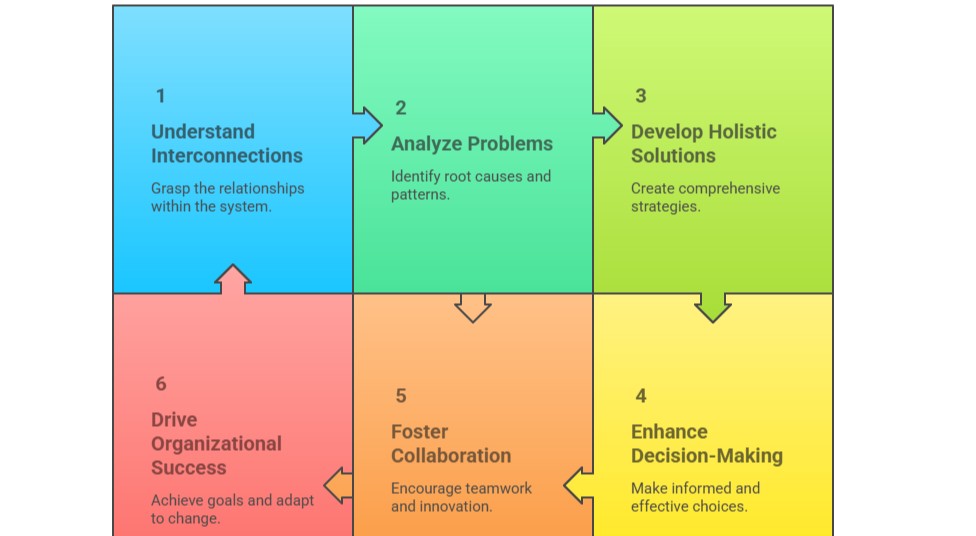
This transformative training course is meticulously designed to equip strategic leaders with the foundational principles and practical application of systems thinking. In today’s interconnected and complex world, traditional linear problem-solving often falls short. Systems thinking offers a powerful lens to understand underlying structures, interdependencies, and dynamics that drive organizational behavior, enabling leaders to identify root causes, anticipate unintended consequences, and formulate more holistic and effective strategies for sustainable impact.
The course will cover a wide array of crucial topics, including a comprehensive introduction to systems thinking for leaders, understanding the fundamental characteristics and components of complex systems, identifying critical causal loops and various feedback mechanisms, uncovering common system archetypes and their implications for organizational behavior, leveraging key leverage points for strategic intervention and lasting change, applying systems thinking methodologies to address real-world strategic challenges, designing organizations and fostering cultures based on systems principles, utilizing data, models, and analytical tools to support systems thinking, mastering the art of leading systemic change and overcoming inherent resistance, and finally, building and nurturing a truly systems-thinking organization capable of sustained adaptation and success.
Who Should Attend the Training
Objectives of the Training
Upon completion of this training, participants will be able to:
Personal Benefits
Organizational Benefits
Training Methodology
The training will adopt a highly interactive and practical methodology, incorporating:
Trainer Experience
Our trainers are seasoned systems thinking practitioners, organizational development consultants, and strategic advisors with extensive experience in applying systems thinking methodologies to solve complex business and societal challenges. They bring a wealth of practical experience in facilitating systemic change, developing dynamic models, and fostering a holistic perspective, ensuring participants gain profound theoretical understanding combined with actionable skills for leading with systems thinking.
Quality Statement
We are committed to delivering high-quality training programs that provide tangible, transformative results. Our courses are meticulously designed, continually updated with the latest research and best practices in systems thinking, organizational complexity, and strategic management, and delivered by expert practitioners to ensure participants acquire relevant, effective skills and knowledge.
Tailor-made courses
We recognize that every organization is a unique system with its own complexities and strategic challenges. We offer customized training solutions that can be specifically tailored to your industry, specific organizational challenges, existing analytical capabilities, and desired strategic outcomes. Please contact us to discuss how we can design a bespoke program that aligns perfectly with your requirements.
Course Duration: 5 days
Training fee: USD 1300
Module 1: Introduction to Systems Thinking for Leaders
Module 2: Understanding Systems and Their Characteristics
Module 3: Identifying Causal Loops and Feedback Mechanisms
Module 4: Uncovering System Archetypes: Common Patterns of Behavior
Module 5: Leveraging Leverage Points for Strategic Intervention
Module 6: Applying Systems Thinking to Strategic Challenges
Module 7: Systems Thinking for Organizational Design and Culture
Module 8: Data, Models, and Tools for Systems Thinking
Module 9: Leading Systemic Change and Overcoming Resistance
Module 10: Building a Systems-Thinking Organization
Requirements:
· Participants should be reasonably proficient in English.
· Applicants must live up to Armstrong Global Institute admission criteria.
Terms and Conditions
1. Discounts: Organizations sponsoring Four Participants will have the 5th attend Free
2. What is catered for by the Course Fees: Fees cater for all requirements for the training – Learning materials, Lunches, Teas, Snacks and Certification. All participants will additionally cater for their travel and accommodation expenses, visa application, insurance, and other personal expenses.
3. Certificate Awarded: Participants are awarded Certificates of Participation at the end of the training.
4. The program content shown here is for guidance purposes only. Our continuous course improvement process may lead to changes in topics and course structure.
5. Approval of Course: Our Programs are NITA Approved. Participating organizations can therefore claim reimbursement on fees paid in accordance with NITA Rules.
Booking for Training
Simply send an email to the Training Officer on training@armstrongglobalinstitute.com and we will send you a registration form. We advise you to book early to avoid missing a seat to this training.
Or call us on +254720272325 / +254725012095 / +254724452588
Payment Options
We provide 3 payment options, choose one for your convenience, and kindly make payments at least 5 days before the Training start date to reserve your seat:
1. Groups of 5 People and Above – Cheque Payments to: Armstrong Global Training & Development Center Limited should be paid in advance, 5 days to the training.
2. Invoice: We can send a bill directly to you or your company.
3. Deposit directly into Bank Account (Account details provided upon request)
Cancellation Policy
1. Payment for all courses includes a registration fee, which is non-refundable, and equals 15% of the total sum of the course fee.
2. Participants may cancel attendance 14 days or more prior to the training commencement date.
3. No refunds will be made 14 days or less before the training commencement date. However, participants who are unable to attend may opt to attend a similar training course at a later date or send a substitute participant provided the participation criteria have been met.
Tailor Made Courses
This training course can also be customized for your institution upon request for a minimum of 5 participants. You can have it conducted at our Training Centre or at a convenient location. For further inquiries, please contact us on Tel: +254720272325 / +254725012095 / +254724452588 or Email training@armstrongglobalinstitute.com
Accommodation and Airport Transfer
Accommodation and Airport Transfer is arranged upon request and at extra cost. For reservations contact the Training Officer on Email: training@armstrongglobalinstitute.com or on Tel: +254720272325 / +254725012095 / +254724452588
| Course Dates | Venue | Fees | Enroll |
|---|

Armstrong Global Institute
Typically replies in minutes